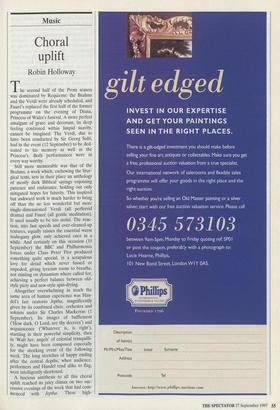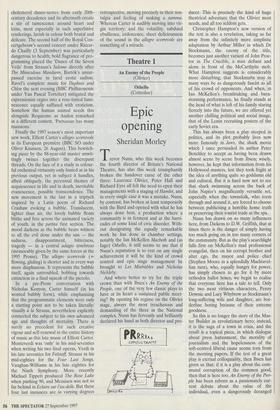Music
Choral uplift
Robin Holloway
The second half of the Prom season was dominated by Requiems: the Brahms and the Verdi were already scheduled, and Faures replaced the first half of the former programme on the evening of Diana, Princess of Wales's funeral. A more perfect amalgam of grace and decorum, its deep feeling contained within limpid suavity, cannot be imagined. The Verdi, due to have been conducted by Sir Georg Solti, had in the event (12 September) to be ded- icated to his memory as well as the Princess's. Both performances were in every way worthy.
Still more memorable was that of the Brahms, a work which, eschewing the litur- gical texts, sets in their place an anthology of mostly dark Biblical sayings enjoining patience and endurance, holding out only mitigated hopes for futurity. This inspired but awkward work is much harder to bring off than the no less wonderful but more single-dimensioned Verdi (all perfervid drama) and Faure (all gentle meditation). It used usually to be too stolid. The reac- tion, into fast speeds and over-cleaned-up textures, equally misses the essential warm mahogany glow, only achieved once in a while. And certainly on this occasion (10 September) the BBC and Philharmonia forces under Claus Peter Flor produced something quite special, in a scrupulous love for detail which never fussed or impeded, giving lyricism room to breathe, not stinting on dynamism where called for, achieving a perfect balance between old- style piety and new-style spin-drying.
Altogether overwhelming in much the same area of human experience was Han- del's last oratorio Jeptha, magnificently given by its combined choir, orchestra and soloists under Sir Charles Mackerras (1 September). Its images of bafflement (`liow dark, 0 Lord, are thy decrees') and acquiescence ('Whatever is, is right'), startling in their powerful simplicity, then In 'Waft her, angels' of celestial tranquilli- ty, might have been composed especially for the shocking event of the following week. The long stretches of happy ending after the central depths, when audience, performers and Handel tend alike to flag, were intelligently shortened. A luscious antithesis to all this choral uplift reached its juicy climax on two suc- cessive evenings of the week that had com- menced with Jeptha. These high- cholesterol dance-scores from early 20th- century decadence and its aftermath create a stir of tumescence around heart and loins, most especially in such superlative renderings, lavish in colour both brutal and delicate. The second half of the Royal Con- certgebouw's second concert under Riccar- do Chailly (3 September) was particularly dangerous to health; bold flagrance of pro- gramming placed the 'Dance of the Seven Veils' from Strauss's Salome directly after The Miraculous Mandarin, Bartok's unsur- passed exercise in lurid erotic sadism. Ravel's complete music for Daphnis and Chloe the next evening (BBC Philharmonic under Yan Pascal Tortelier) mitigated the expressionist orgies into a rose-tinted lumi- nescence equally suffused with eroticism. Somehow the human animal needs this alongside Requiems: as Auden remarked in a different context, 'Parnassus has many mansions.'
Finally the 1997 season's most important new work, Elliott Carter's allegro scorrevole in its European premiere (BBC SO under Oliver Knussen, 26 August). This bewitch- ing piece by the 88-year-old master unwit- tingly twines together the discrepant threads. On the face of it a study in colour- ful orchestral virtuosity only hinted at in his previous output, yet in subject it handles, albeit obliquely, the perennial themes of acquiescence in life and in death, inevitable evanescence, possible transcendence. The new movement is the last in a triptych inspired by a Latin poem of Richard Crashaw evoking a bubble. Translucent, lighter than air, the lovely bubble floats blithe and free across the animated variety of youth, in the partita first section. The mood darkens as the bubble bears witness to all the evil done under the sun — the sadness, disappointment, bitterness, tragedy — in a central adagio tenebroso (memorably given by the same forces at the 1995 Proms). The allegro scorrevole (= flowing, gliding) is shorter and in every way more diaphanous. It represents the bubble itself, again untroubled, bobbing towards extinction in a final squeak of the piccolo.
In a pre-Prom conversation with Nicholas Kenyon, Carter himself (in his wonted bubbly form), while emphasising that the programmatic elements were only a starting point not to be taken literally/ visually a la Strauss, nevertheless explicitly connected the subject to his own advanced age and thoughts of mortality. There is surely no precedent for such creative vigour and self-renewal in the entire history of music as this late music of Elliott Carter. Monteverdi was 'only' in his mid-seventies when writing his two final operas, Verdi in his late seventies for Falstaff Strauss in his mid-eighties for the Four Last Songs, Vaughan-Williams in his late eighties for the Ninth Symphony. More recently Michael Tippett produced The Rose Lake when pushing 90, and Messiaen was not so far behind in Eclairs sur l'au-deli But these four last instances are in varying degrees retrospective, moving precisely in their nos- talgia and feeling of making a summa. Whereas Carter is audibly moving into vir- gin territory; and the volatility, subdued ebullience, iridescence, sheer deliciousness of the sound in the allegro scorrevole are something of a miracle.











































































 Previous page
Previous page